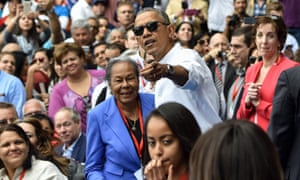The Emmy award-winning film-maker Ken Burns has made documentaries about the American civil war, jazz, the famous case of the five black and Latino teenagers wrongly convicted of gang-raping a woman in New York’s Central Park and more. Now, he and co-directors Sarah Burns and David McMahon turn their attentions to baseball legend Jackie Robinson. Their four-hour film will air on PBS on 11-12 April.
The documentary delves into Robinson’s life before and during his boundary-breaking career with the Brooklyn Dodgers. Burns is well acquainted with the world of baseball, a fact he documented in a nine-part series on America’s pastime, but he doesn’t consider Robinson to be a return to his area of expertise. “I never left baseball,” says Burns. “Ever since I was a little boy baseball has been this great love, but I never thought I would return to Jackie Robinson.”
Burns had put Robinson center stage in Baseball and thought he had done him justice. Robinson’s widow, however, disagreed. “Over the years, [Rachel Robinson] had been asking me if I would consider doing a standalone,” said Burns. He was busy with other films, though, and it took him a few years to sink his teeth into the project, even though he knew separating the myth from the man was an important story to tell. “The mythology around Jackie Robinson had sort of obscured a more complicated and interesting figure,” says Burns.
The film fights against what Burns considers to be a “sanitized” version of Robinson’s legacy, which has Robinson turning the other cheek no matter what atrocities are hurled at him. In reality, Robinson was the grandson of slaves who had little tolerance for discrimination. He was a fiery fighter, who fiercely defended the rights of African Americans long after his playing career came to an end. Robinson’s brave efforts led Martin Luther King Jr to proclaim that Robinson “was a sit-inner before sit-ins, a freedom rider before freedom rides”.
“He represents a signal moment in civil rights for the United States,” says Burns. In the film, Burns portrays Robinson as a bold, brave civil rights firebrand, a side that was rarely, if ever, seen on the baseball field. “When Jackie Robinson trots out to first base on April 15, 1947, Martin Luther King Jr is a junior at Morehouse College,” says Burns. “There are no organized sit-ins at lunch counters, although Jackie Robinson did it on his own as a teenager. Rosa Parks was a decade away from refusing to give up her seat on a Montgomery, Alabama, bus – something Jackie had done three years before on a military bus on Fort Hood in Texas.” Robinson was court-martialed for the act, but was acquitted.
The documentary also reveals that Robinson’s grit and fight were an advantage on the baseball field, even if it made some of his team-mates – white and black – nervous. “Without that anger, you don’t get Jackie Robinson,” sportswriter Howard Bryant says in the documentary.

The film makes it clear that Robinson would have been one of America’s greatest civil rights pioneers, even if he never stepped foot on a baseball field – a case bolstered by interviews with Barack and Michelle Obama; Robinson’s wife, Rachel; and many more. As much as Burns loves baseball, when it comes to telling the life story of Robinson, his sports career was almost a footnote. “The backstory of how he got to that moment and the end story of how he left that moment are as interesting, if not more interesting, than the familiar year of 1947 when he comes up with the Brooklyn Dodgers,” said Burns.
In his research, Burns found that some of the most famous bits of mythology surrounding Robinson – some Burns himself had repeated in Baseball – were simply not true. “We walked them back in this film,” said Burns. “Very celebrated things that just didn’t happen, but there were nuances about them that make them spectacularly more interesting.”
While the film is certainly historical, Burns also sees Robinson’s story as incredibly contemporary and relevant to the present day. “Everything that we are dealing with today, is mirrored in what Jackie went through, whether it’s driving while black, stop and frisk, Confederate flags, or wholesale housing discrimination,” said Burns. “It lets Jackie speak from the grave with an authority about the present, that perhaps our own heated, angry, uncivil discourse today makes impossible to do.”
In the film, Robinson’s wife Rachel seeks to balance the myth of Robinson on the field and his actions off. “He was not an angry black man,” she said. “He was an athlete who wanted to win.”
Burns now credits Robinson with one more win: “Not only did this film bring me back to the greatest game that’s ever been invented, baseball, but it brought me to the most important person in the history of baseball.”



